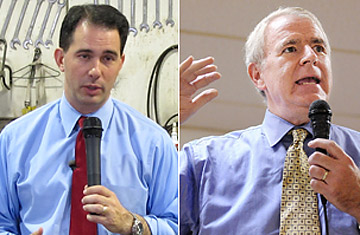
Wisconsin's high-speed rail is a defining campaign issue for gubernatorial candidates Republican Scott Walker, left, and Democrat Tom Barrett
Wisconsin was one of the big winners in last year's $8 billion high-speed rail competition, snagging $810 million for a new passenger line between Madison and Milwaukee. So in July, President Obama's Transportation Secretary, Ray LaHood, visited to hail the most ambitious transportation initiative since President Eisenhower launched the interstate-highway system. "High-speed rail is coming to Wisconsin," LaHood declared. "There's no stopping it!"
We'll see.
Milwaukee County executive Scott Walker, the Republican candidate for governor, has denounced the train as a Big Government boondoggle, and has vowed to send the money back to Washington if he's elected. He has even launched a website, www.notrain.com, attacking Obama and his opponent, Milwaukee Mayor Tom Barrett, for supporting the new line. Walker and Barrett don't agree on much, but they agree that high-speed rail is a defining issue in their campaign.
"Absolutely," says Walker spokeswoman Jill Bader. "It's a perfect symbol of out-of-control spending on things we don't need at a time we can't afford it."
High-speed rail was once a bipartisan dream, but ever since it was included in Obama's controversial $787 billion stimulus bill, it's become another hyperpartisan issue in a hyperpartisan climate. Republican candidates for governor in California, Florida and Ohio, three of the other big winners in the rail-funding sweepstakes, are also talking about stopping trains and giving the government its money back. It's a proxy issue for the role of government at a time when the GOP message is all about less.
On Thursday, LaHood distributed another $2.5 billion in high-speed grants to 23 states; there were more than $3 worth of applications for every $1 in grants, and no current governors have made any noises about turning the money down. "States understand that high-speed rail represents a unique opportunity to create jobs, revitalize our manufacturing base, spur economic development and provide people with an environmentally friendly transportation option," said LaHood, a former Republican Congressman from Illinois. But that understanding could change with a GOP sweep on Tuesday, and LaHood can't help but wonder what Eisenhower would have thought of the antigovernment sentiment dominating their party these days. "Can you imagine if Ohio or Wisconsin or any other state had said, 'No, thanks, we don't think that highway thing is going anywhere'?" he recently asked on his blog.
LaHood envisions high-speed rail inaugurating a new era of metropolitan mobility, cleaner and greener than all-cars-all-the-time, creating short-term construction jobs and long-term economic development at firms like Talgo, a Spanish train manufacturer with a factory in Wisconsin. And with countries like Saudi Arabia, Turkey and Brazil racing to catch train-friendly nations like Japan and Germany — and China building more high-speed track than the rest of the world combined — Obama has framed high-speed rail as an issue of national pride and economic competitiveness.
But Walker says the federally financed line is too expensive for debt-ridden Wisconsin, because the state would have to pay about $8 million a year to maintain it. The Milwaukee-Madison trains would have a top speed of 110 m.p.h. (180 km/h), a far cry from the 220-m.p.h. (350 km/h) bullet trains zipping around Europe and Asia; initially, they'd average less than 60 m.p.h. (100 km/h), which wouldn't be a particularly attractive alternative to the modest intercity drive. And the rail line itself would create only a few permanent jobs. One recent poll found that Wisconsin residents opposed the new line by 55 to 41 — and supported Walker over Barrett by 50 to 41.
Meanwhile, Barrett has tried to use high-speed rail as a character issue, hammering Walker for initially promising to divert the train money to roads, which isn't allowed. "This is a defining issue of trust and honesty," says Barrett spokesman Phil Walzak. Barrett has also accused Walker of hypocrisy for supporting a popular Chicago-Milwaukee train, but not the Obama extension to Madison. "It's an obvious attempt to manufacture a political issue he can run on," Walzak says.
Ultimately, the Milwaukee-Madison rail is not really about stimulus — the trains won't start rolling for several years. And it's not just about Milwaukee or Madison; it's a step toward connecting Chicago to the Twin Cities at reasonably high speeds, which is part of a larger plan to connect all the major cities of the Midwest into a regional network, providing viable energy-efficient alternatives to long drives and short flights. Like other long-term Obama priorities slipped into the stimulus — clean energy, electronic medicine, the Race to the Top education reforms — it's a legacy program, an effort to use government to create something of enduring value.
These days, that's not an issue that anyone can run on.
